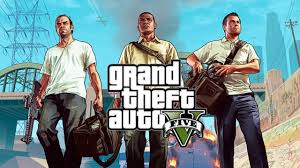To some, Grand Theft Auto (GTA) 5 is just a game, allowing people to relieve the stress of a day in a harmless way. To others, it is an abomination, rearing a generation of kids leaning towards acts of violence and crime.
A record-selling game released in September of 2013, GTA 5 exceeded already high commercial expectations. But is this sort of game poisoning the youth of America? Many question the fact that a game saturated with senseless murder, constant violence, and blatant disregard for the law does not negatively affect those who play it.
Opponents of the game fear that players, especially children and teenagers, are desensitized to the immoralities in the game. They fear acts of violence and misogyny could be overlooked or seem commonplace as a result. And in many cases, these assumptions seem to be spot-on.
For example, just a week after the release of the game, an Auburn University lacrosse player stole a truck, hitting nine other vehicles before stopping, all just to see if the experience would be just as fun as the game. Some even insist that violent video games cause or are at least greatly responsible for mass shootings, numbing people to the depravity in many of these games. Others hotly disagree.
Advocates of the game and its content argue that a game alone is not nearly enough to influence these actions, that there is a separation between fantasy and reality. Although the research is not entirely conclusive, it tends to find that video games are not the primary determinant of such heinous acts. Nonetheless, experts believe these games have the potential to send those at risk over the edge.
Mr. Jude Harrington, junior and senior theology teacher, leans in the same direction, admitting that “I think there is a bit of desensitizing.” Even so, he said that “I’m not convinced that because you are desensitized it causes you to do that action or not understand the gravity of it when you see the real thing,” elaborating that “the game is not the overarching cause.”
He thinks that mental illness or a poor upbringing would be a more significant influence. If anything, “not having the conversation of ‘this is what’s going on'” with regards to a game or other offensive content is “a fault of the parenting.”
Although some fear that a game can permanently and irreversibly affect one’s thoughts and actions, others would argue that the average gamer is largely unaffected by the content despite being aware of the inherent immorality in the games.
Yet violence for the sake of violence is alarming to many who are concerned that a society becomes accustomed to that sort of content. Mr. Harrington believes that “there has to be a line somewhere between ‘yes, violence is a reality and it’s gonna be in the game’ and…well, ‘this is gratuitous.'” Despite his relatively open views about these games, he questioned “what is humanity coming to when the entertainment is [based on the premise] that ‘oh, I get to be violent?'”
Despite being slightly less essential to the content of the game, prostitution and misogyny have always played a role in the GTA Series. Mrs. Katie Segal, history teacher and moderator of the Not For Sale Club, said that she fears that a game like this “gives [its audience] a view of women as being a commodity, something that is there for their pleasure and consumption.”
Ultimately, she cites the fact that this attitude towards and treatment of women comes from trends aside from the game: “There is a larger culture of ‘pimp’ being a positive thing,” citing the MTV show Pimp My Ride as an example. She went on to say that “pimps are really exploitative” and “leach off of others and usually are very abusive, and by glorifying that and making it a positive term, it associates that ‘oh, it’s okay for me to treat women as less than.’ Because the target audience is so young, I fear that younger generations are going to regress and go back to these old outdated discriminatory ideas rather than realizing how far we’ve come as a society,” she continued.
Supporters of the game content would cite Rockstar Games’ (producer of the GTA series) tendency towards satire, often mocking the patterns in society, but even so, certain aspects of GTA are hardly defensible. A mission in the game actually forces the gamer to torture an individual to succeed, an aspect of the game that brought international outrage, especially from human rights organizations. As an essential part of the mission, it is certain that young children completed this mission, witnessing the unspeakable acts of barbaric punishment.
With all the millions who have played GTA 5 and the millions more who have heard or read about it, there is certainly no way to definitively say whether the immorality and injustice in the game are justified or at least tolerable. The issue is not black and white. Each person has their own opinion and outlook, but all can agree that despite just being a game, GTA 5 has immense power, regardless of whether it entertains or offends. For some, this is a game bringing nothing but pleasure and for others, nothing but disgust.






